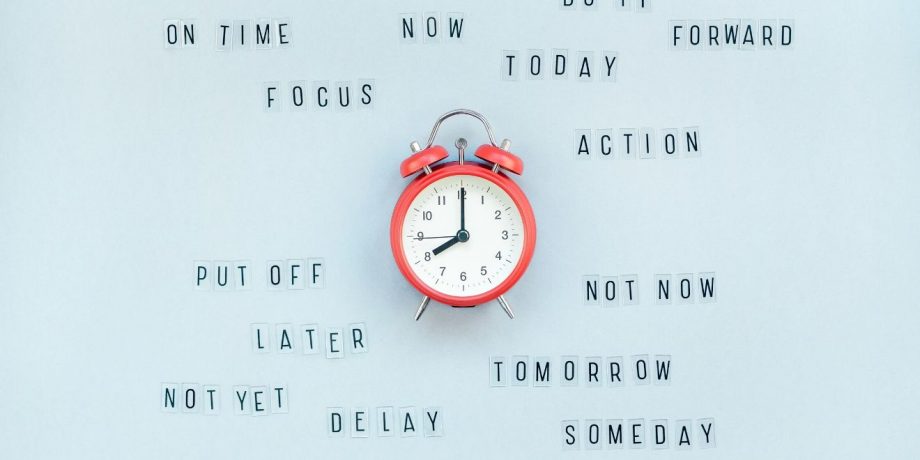The Akrasia Effect: Why We Don’t Follow Through on What We Set out to Do and What to Do About It

Akrasia Effect is a rather fancy way of describing what many people know of, and suffer from, called ‘procrastination.’ Akrasia about doing one thing, despite the fact that you should be doing something else, and you are aware of that.
The Akrasia Effect is when you make a commitment to something but then keep finding other ways to fill your time instead of the thing you committed to. The primary treasure chest of tools you need to defeat akrasia is what we’re going to cover in this article.

Akrasia is why school kids leave homework assignments until the last possible minute. Or why adults put off starting their diet until tomorrow. It ultimately comes down to a lack of willpower and self-discipline. If your willpower is low, for whatever reason, then fighting akrasia will likely be inevitable.
Willpower is called into play every time you’re breaking away from a pattern of behavior that you normally perform. It’s estimated that approximately 95% of our daily thoughts are habitual. So, we’re most definitely habit machines, and every time we’re trying to break away from a habit — akrasia is likely to appear in our day.
Behavioral economists might give an akrasia definition like this, ‘time inconsistency.’ This is basically a cognitive bias, and it’s the concept that our human brain values a reward more highly that provides immediate gratification over a reward that we need patience for.
Examples of this might be laying down a plan to lose ‘x’ amount of lbs, or save ‘x’ amount of money, or be fluent in a new language. These are actually plans for future awards. You won’t enjoy losing the weight at yoga class and avoiding your favorite sweet-treats — but you hope you’ll enjoy the bonus of being slimmer at some point in the future.
Thinking about it logically, it feels good to envision that future goal being achieved. However, when it comes to acting and making ‘’present moment’’ decisions, willpower might be lacking, and akrasia can appear.
We’ve already given procrastination a fancy name (akrasia), and so, what about a more elegant term for ‘ willpower ?’
Indeed, clinical psychologists label a lack of willpower as ‘abulia.’ But it’s time to move on from giving labels to things and describing what they are. We, as a human species, suffer from akrasia.
So, what can we do about it?

A commitment device is a way of controlling your future deeds by a decision you’re making in the present moment. Basically, as a result of the current action, you have no choice but to remain committed to a future goal. This will help kill akrasia!
Let’s say you have a problem waking up in the morning. When your alarm goes off on your phone, you simply hit the snooze button instinctually and nod-off back to sleep. You might even do this without being totally conscious of it. As such, you’re killing a commitment that you made to yourself the evening before to get up at ‘x’ time. Your willpower (abulia) is nowhere to be seen.
So how do you combat this with a commitment device?
Put your phone on the other side of your room. Now, when the alarm goes off, you have no choice but to get out of bed to switch it off. Your present action — putting the phone on the other side of your room the night before — has given your ‘morning-self’ no option but to get out of bed.

As a secondary example, let’s say you want to start a diet but have a bad habit of snacking on junk food late at night. Simply not purchasing junk food when you go to the grocery store is your present moment commitment device. Your junk food cravings will now have nothing to munch on later that night.
The pain of akrasia is often worse than that of actually doing what we’re delaying. Once we’re in the midst of the action we’ve planned to do, it’s not usually that bad. What’s the reason for us suffering from akrasia so much? It’s often because we set our expectations of future results too high. The habits/actions required to meet those results then become intimidating and daunting. All of the friction caused by akrasia is about starting the desired behavior.
https://www.youtube.com/watch?v=yC3S9e7yl_0
Start off small and make very slow but steady gains. Beating akrasia is about getting 1% better consistently. The Japanese have a term for this slow and steady improvement, and they call it ‘Kaizen.’
Focus on building small achievable everyday habits, rather than looking at a big goal off in the distant future. Master the art of ‘showing up,’ and big goals will soon begin to appear on the horizon, and akrasia will cease to have a hold on you.

Just do what you say you’re going to do by setting an ‘’implementation intention’’. Take out a piece of paper and a pen and write down your intention. So, it might be something like, ‘I will run for at least 45 minutes on [day] in [location] at [time].’
After you’ve written it down, say it out loud to yourself.
It sounds so darn basic that you might even doubt its effectiveness for akrasia. However, it’s been documented before that implementation intentions can increase the chances of an action being performed in the future by 2x to 3x.
So, we’ve spoken a lot about the akrasia meaning and definition, and then we’ve covered three ways that you can utilize to combat your abulia and akrasia episodes. However, it’s important to note: this is NEVER going to go away. Akrasia is a part of life.

Even the most insanely self-disciplined people with iron willpower suffer from akrasia to some extent. They might rise at 5 a.m., go for a hike, take a cold shower, meditate, and drink raw eggs, all before getting into the office before 9 a.m. But if you were to ask this same person to sit down and do some paperwork, they might be hit with a bout of akrasia. It comes down to a question of interest and motivation. We generally won’t suffer from akrasia for things we are highly-motivated and enjoy doing.
What about beating akrasia for the things that we don’t enjoy doing but want good results for, like losing weight, for instance? Well then, you’re going to need to dig into those willpower reserves or use one of the three tools we’ve mentioned above.
Do you think it’s possible to build your willpower and self-discipline to the point that you’re an action-taker, no matter what, and never suffer from akrasia again?

Thomas Quarry is a data scientist and psychotherapist who specialized in akrasia treatment for some of the most prestigious establishments in Central London for over 15 years. He also helped coach professional sports athletes suffering from akrasia. He lives in Angel, North London, with his wife and three lovable pugs.
The Akrasia Effect is when you make a commitment to something but then keep finding other ways to fill your time instead of the thing you committed to. The primary treasure chest of tools you need to defeat akrasia is what we’re going to cover in this article.

What Is Akrasia in Modern Life?
Akrasia is why school kids leave homework assignments until the last possible minute. Or why adults put off starting their diet until tomorrow. It ultimately comes down to a lack of willpower and self-discipline. If your willpower is low, for whatever reason, then fighting akrasia will likely be inevitable.
Willpower is called into play every time you’re breaking away from a pattern of behavior that you normally perform. It’s estimated that approximately 95% of our daily thoughts are habitual. So, we’re most definitely habit machines, and every time we’re trying to break away from a habit — akrasia is likely to appear in our day.
Another Way to Define Akrasia: Time Inconsistency
Behavioral economists might give an akrasia definition like this, ‘time inconsistency.’ This is basically a cognitive bias, and it’s the concept that our human brain values a reward more highly that provides immediate gratification over a reward that we need patience for.
Examples of this might be laying down a plan to lose ‘x’ amount of lbs, or save ‘x’ amount of money, or be fluent in a new language. These are actually plans for future awards. You won’t enjoy losing the weight at yoga class and avoiding your favorite sweet-treats — but you hope you’ll enjoy the bonus of being slimmer at some point in the future.
Thinking about it logically, it feels good to envision that future goal being achieved. However, when it comes to acting and making ‘’present moment’’ decisions, willpower might be lacking, and akrasia can appear.
What Is Abulia? — Abulia and Akrasia Labels
We’ve already given procrastination a fancy name (akrasia), and so, what about a more elegant term for ‘ willpower ?’
Indeed, clinical psychologists label a lack of willpower as ‘abulia.’ But it’s time to move on from giving labels to things and describing what they are. We, as a human species, suffer from akrasia.
So, what can we do about it?

A Framework to Beat Akrasia
Method One for Akrasia: Commitment Device
A commitment device is a way of controlling your future deeds by a decision you’re making in the present moment. Basically, as a result of the current action, you have no choice but to remain committed to a future goal. This will help kill akrasia!
Let’s say you have a problem waking up in the morning. When your alarm goes off on your phone, you simply hit the snooze button instinctually and nod-off back to sleep. You might even do this without being totally conscious of it. As such, you’re killing a commitment that you made to yourself the evening before to get up at ‘x’ time. Your willpower (abulia) is nowhere to be seen.
So how do you combat this with a commitment device?
Put your phone on the other side of your room. Now, when the alarm goes off, you have no choice but to get out of bed to switch it off. Your present action — putting the phone on the other side of your room the night before — has given your ‘morning-self’ no option but to get out of bed.

As a secondary example, let’s say you want to start a diet but have a bad habit of snacking on junk food late at night. Simply not purchasing junk food when you go to the grocery store is your present moment commitment device. Your junk food cravings will now have nothing to munch on later that night.
Method Two for Akrasia: Don’t Be so Hard on Yourself
The pain of akrasia is often worse than that of actually doing what we’re delaying. Once we’re in the midst of the action we’ve planned to do, it’s not usually that bad. What’s the reason for us suffering from akrasia so much? It’s often because we set our expectations of future results too high. The habits/actions required to meet those results then become intimidating and daunting. All of the friction caused by akrasia is about starting the desired behavior.
https://www.youtube.com/watch?v=yC3S9e7yl_0
Start off small and make very slow but steady gains. Beating akrasia is about getting 1% better consistently. The Japanese have a term for this slow and steady improvement, and they call it ‘Kaizen.’
Kaizen: a Japanese business philosophy of continuous improvement of working practices, personal efficiency, etc.
Focus on building small achievable everyday habits, rather than looking at a big goal off in the distant future. Master the art of ‘showing up,’ and big goals will soon begin to appear on the horizon, and akrasia will cease to have a hold on you.

Method Three for Akrasia: Do What You SAY You’re Going to Do
Just do what you say you’re going to do by setting an ‘’implementation intention’’. Take out a piece of paper and a pen and write down your intention. So, it might be something like, ‘I will run for at least 45 minutes on [day] in [location] at [time].’
After you’ve written it down, say it out loud to yourself.
It sounds so darn basic that you might even doubt its effectiveness for akrasia. However, it’s been documented before that implementation intentions can increase the chances of an action being performed in the future by 2x to 3x.
Never-Ending Fight With Abulia and Akrasia
So, we’ve spoken a lot about the akrasia meaning and definition, and then we’ve covered three ways that you can utilize to combat your abulia and akrasia episodes. However, it’s important to note: this is NEVER going to go away. Akrasia is a part of life.

Even the most insanely self-disciplined people with iron willpower suffer from akrasia to some extent. They might rise at 5 a.m., go for a hike, take a cold shower, meditate, and drink raw eggs, all before getting into the office before 9 a.m. But if you were to ask this same person to sit down and do some paperwork, they might be hit with a bout of akrasia. It comes down to a question of interest and motivation. We generally won’t suffer from akrasia for things we are highly-motivated and enjoy doing.
What about beating akrasia for the things that we don’t enjoy doing but want good results for, like losing weight, for instance? Well then, you’re going to need to dig into those willpower reserves or use one of the three tools we’ve mentioned above.
Do you think it’s possible to build your willpower and self-discipline to the point that you’re an action-taker, no matter what, and never suffer from akrasia again?

Author’s Bio
Thomas Quarry is a data scientist and psychotherapist who specialized in akrasia treatment for some of the most prestigious establishments in Central London for over 15 years. He also helped coach professional sports athletes suffering from akrasia. He lives in Angel, North London, with his wife and three lovable pugs.




































































































